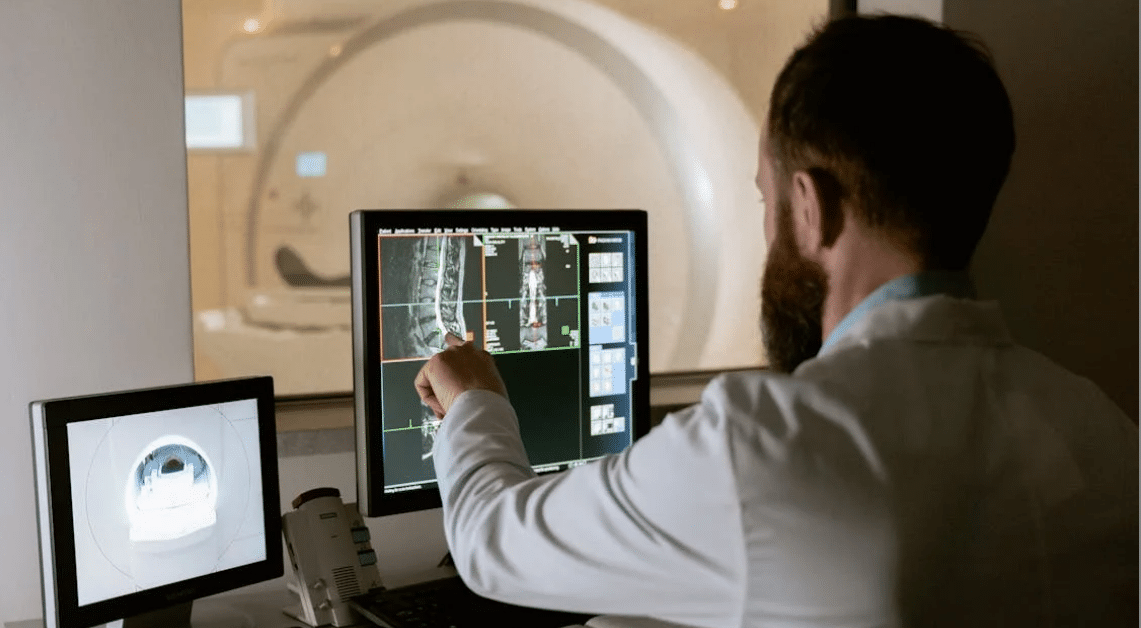The healthcare industry is now at the forefront of a digital revolution in adopting technological innovations. This transformation is driven by the need to improve patient care, enhance operational efficiency, and reduce costs. Digital transformation in healthcare involves the integration of advanced technologies such as Artificial Intelligence (AI), Big Data, Internet of Things (IoT), and telemedicine into medical practices and hospital systems. This blog will explore the key components of digital transformation in healthcare, its benefits, and the role of skilled medical virtual assistants (VAs) in this evolving landscape.

Key Components of Digital Transformation in Healthcare
- Electronic Health Records (EHRs) EHRs have revolutionized the way patient data is stored, accessed, and shared. By digitizing health records, healthcare providers can ensure that patient information is always up-to-date, reducing errors and improving the quality of care. EHRs also facilitate better coordination among healthcare professionals, enhancing the overall patient experience.
- Telemedicine Telemedicine has gained significant traction, especially during the COVID-19 pandemic. It allows patients to consult with healthcare providers remotely, reducing the need for in-person visits. This technology not only improves access to healthcare, particularly for those in remote areas, but also helps in managing chronic conditions more effectively.
- Artificial Intelligence (AI) and Machine Learning AI and machine learning are transforming diagnostics, treatment planning, and patient monitoring. AI algorithms can analyze vast amounts of data to detect patterns and predict outcomes, aiding in early diagnosis and personalized treatment plans. For instance, AI-powered imaging tools can identify anomalies in medical images with higher accuracy than human radiologists.
- Big Data and Analytics The healthcare industry generates a massive amount of data daily. Big data analytics can process and analyze this data to uncover insights that can lead to improved patient outcomes, optimized operations, and cost savings. Predictive analytics, for example, can help identify patients at risk of developing certain conditions, allowing for proactive interventions.
- Internet of Things (IoT) IoT devices, such as wearable fitness trackers and smart medical devices, are becoming increasingly prevalent in healthcare. These devices collect real-time health data, which can be monitored by healthcare providers to track patients’ health and intervene when necessary. IoT can also enhance hospital operations by streamlining asset management and improving patient flow.
Benefits of Digital Transformation in Healthcare
- Improved Patient Care Digital tools and technologies enable healthcare providers to offer more accurate diagnoses, personalized treatment plans, and continuous monitoring, leading to better patient outcomes. Telemedicine and remote monitoring, for example, ensure that patients receive timely care without the need for frequent hospital visits.
- Operational Efficiency Automation and digital tools streamline administrative tasks, reduce paperwork, and minimize errors. This efficiency frees up healthcare professionals to focus more on patient care rather than administrative duties. Additionally, predictive analytics can help hospitals manage resources more effectively, reducing wait times and improving the patient experience.
- Cost Reduction By optimizing operations and improving patient outcomes, digital transformation can lead to significant cost savings. Remote monitoring and telemedicine reduce the need for hospital admissions and in-person consultations, lowering healthcare costs. Predictive analytics can also help in preventing costly medical emergencies by enabling early interventions.
- Enhanced Data Security Digital transformation brings advanced cybersecurity measures to protect sensitive patient data. Implementing robust security protocols ensures that patient information is safeguarded against cyber threats, maintaining patient trust and compliance with regulatory requirements.
Challenges and Considerations
While the benefits of digital transformation in healthcare are substantial, several challenges need to be addressed:
- Data Privacy and Security Protecting patient data is paramount. Healthcare providers must implement stringent security measures to safeguard sensitive information from cyber threats and breaches.
- Interoperability Ensuring that different digital systems and technologies can communicate and share data seamlessly is crucial for the success of digital transformation. Interoperability issues can hinder the flow of information and affect patient care.
- Training and Adoption Healthcare professionals need to be adequately trained to use new technologies effectively. Resistance to change and lack of technical skills can slow down the adoption of digital tools.
- Regulatory Compliance The healthcare industry is heavily regulated, and compliance with various standards and regulations is essential. Ensuring that digital transformation initiatives adhere to these regulations is critical to avoid legal issues.
The Role of Skilled Medical VAs from HirebizMed
In this rapidly evolving digital landscape, the demand for skilled medical professionals who can navigate and leverage these technologies is on the rise. This is where HirebizMed comes into play. Hiring skilled medical virtual assistants (VAs) from HirebizMed can significantly enhance the efficiency and effectiveness of healthcare operations.
Medical VAs from HirebizMed are trained to handle a wide range of tasks, from managing EHRs and scheduling appointments to assisting with telemedicine consultations and handling administrative duties. Their expertise in using digital tools and technologies allows healthcare providers to focus more on patient care, ensuring better outcomes and improved operational efficiency.
Moreover, medical virtual assistants can provide valuable support in data management, helping to analyze and interpret big data to uncover insights that can drive better decision-making. By leveraging the skills of medical VAs from HirebizMed, healthcare providers can fully harness the benefits of digital transformation, delivering superior patient care while optimizing their operations.
Digital transformation is revolutionizing the healthcare industry, offering unprecedented opportunities to improve patient care, enhance operational efficiency, and reduce costs. By embracing technologies such as AI, big data, IoT, and telemedicine, healthcare providers can navigate this transformation successfully. Moreover, hiring skilled medical VAs from HirebizMed can further enhance the benefits of digital transformation, ensuring that healthcare organizations are well-equipped to meet the demands of the future.
For healthcare providers looking to stay ahead in this digital age, investing in digital transformation and leveraging the expertise of HirebizMed’s medical assistants is a strategic move towards a more efficient, effective, and patient-centric healthcare system. If you want to learn more, schedule a free consultation here.

